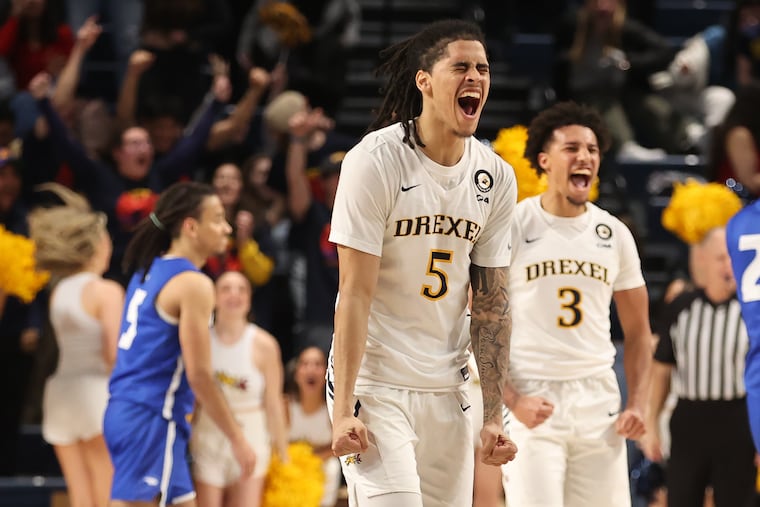Drexel’s win over Hofstra on Thursday could pay dividends in early March. Here’s why.
Drexel improved to 9-4 in the CAA and put itself in solid position ahead of the conference tournament with a Thursday night win over Hofstra.

Zach Spiker will swear up and down that he’s not paying attention to the standings, and maybe he’s not, but we can pay attention for him.
After losing four of their last five games, things were getting a little dicey for Drexel, which started Coastal Athletic Association play by winning its first seven games.
It only takes a few games for things to get off the tracks a little, and what looked to be team destined for a double bye at the conference tournament was flirting with falling to the middle of the pack.
The flirtation lasted into the second half Thursday inside the Daskalakis Athletic Center. Drexel trailed Hofstra by 10 at halftime, but the Dragons flipped a switch and came away with a 79-77 win that could pay big dividends in a few weeks.
Even if Spiker, Drexel’s coach, isn’t interested in the topic.
Just five games stand between Drexel and the CAA tournament in Washington. The Dragons entered Thursday in a four-way tie for third place in the conference. What’s significant is that the top four of the 14 teams get a bye to the quarterfinals of the conference tournament. What’s one way to help yourself get out of a one-bid league? Minimize the amount of games you need to rattle off to do it.
After Thursday’s results, Drexel (16-10, 9-4) is a game clear of Hofstra and Delaware — with a win over both of those teams — and only a game behind UNC-Wilmington and College of Charleston in first place.
So, important, yes?
“I just want to win games,” Spiker said, rejecting the premise. “I want to keep playing with this group. I love our players. I love their resolve. I love the voice in the locker room at halftime. It’s not as quiet as you might imagine. Guys care.”
» READ MORE: How golf balls and ‘the culture’ are impacting Drexel’s historic start to the CAA basketball season
OK, so maybe it was how Drexel won that could pay dividends in a few weeks, rather than the mathematics in the standings.
Drexel scored the first seven points in the second half to cut into Hofstra’s lead. The Dragons took their first lead of the game about seven minutes into the second half. But Hofstra, behind Tyler Thomas, seemed to have an answer any time Drexel tied the game or took the lead. Then came a turning point of sorts.
Thomas, who led all scorers with 34 points, hit baskets on consecutive possessions to put Hofstra back up five with 7 minutes, 18 seconds to go. But he then was called for a technical foul after Drexel’s Mate Okros got to the rim and scored via a goaltending call, resulting in a four-point Drexel possession.
The Dragons seized control of the game there, using a 12-2 run to turn a five-point deficit into a five-point lead with 4 minutes, 55 seconds to play.
Two key winning plays for Drexel came at each end. Jamie Bergens, who led the Dragons with 16 points, sank a deep three-pointer as the shot clock expired. Later, Amari Williams, who surpassed 1,000 points in his Drexel career during the game, swatted a Hofstra shot attempt with 40 seconds left that could’ve tied the game.
Drexel missed a few free throws down the stretch but got a defensive stop at the end to preserve the win.
“This team is super resilient,” Bergens said. “We’ve been in tough situations.”
» READ MORE: Lucas Monroe is Drexel’s ‘glue guy,’ but the least interesting thing about him is basketball
The Dragons shot 61.5% from the field in the second half and outscored Hofstra, 47-35. Hofstra shot 68% in the first half and then 36% in the second half as the Dragons turned up the defensive intensity.
“Just another night in the CAA,” Spiker said.
That was before he learned about other results from around the conference, results that put his team in better positioning. Drexel finishes with three of its final five at home. There was no time for looking at the standings, though. The Dragons host Campbell on Saturday (2 p.m., FloHoops), and it was time to start scouting.
“Mature teams with three fifth-year guys and two fourth-year juniors have to turn the page quickly,” Spiker said. “I’d celebrate this one all night if we could.”